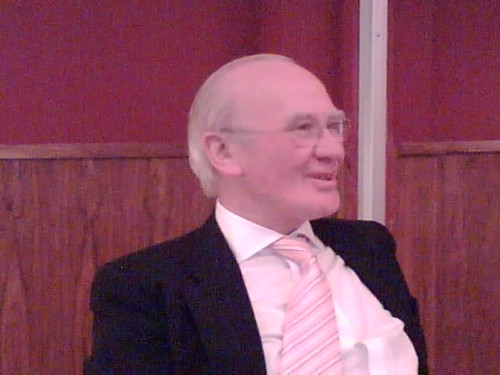I was very chuffed to be invited earlier in the week to take part in an interview with Ming following today’s speech. At first, I thought I would have to decline, but as I was due to be in London anyway tomorrow I decided it was too good an opportunity to miss so rearranged my flight (which I will be carbon-offsetting, of course) and headed down.
The interview
It was a relatively information half hour session with Ming and the four of us. I hadn’t met Mign before and can report that he’s surprisingly easy to get on with. He was friendly and very keen to demonstrate his commitment to using the internet as a way to reach out to patry members as well as to the public.
 I started off by asking him how he would characterise his first 100 days as leader. “Challenging,” was his reply. He had chatted with Paddy Ashdown recently and they agreed that it is nothing like any other job they had done. Little elsewhere prepares you to be taking such big decisions with important consequences. He also said that he had had to adjust to being leader not just of the MPs in Westminster but of the party as a whole – he had never been on the Federal Executive or the Federal Policy Committee before so there is a whole culture of party meetings to get used to. He was also concerned not to be stuck in meetings as leader. He noted that he had no period of run-in as leader. He was immediately plunged into the local election campaign and commitments that had carried over from Charles’s tenure.
I started off by asking him how he would characterise his first 100 days as leader. “Challenging,” was his reply. He had chatted with Paddy Ashdown recently and they agreed that it is nothing like any other job they had done. Little elsewhere prepares you to be taking such big decisions with important consequences. He also said that he had had to adjust to being leader not just of the MPs in Westminster but of the party as a whole – he had never been on the Federal Executive or the Federal Policy Committee before so there is a whole culture of party meetings to get used to. He was also concerned not to be stuck in meetings as leader. He noted that he had no period of run-in as leader. He was immediately plunged into the local election campaign and commitments that had carried over from Charles’s tenure.
Unsurprisingly, Ming identified Prime Minister’s Questions as a particularly challenging part of the job. He said it was different from Foreign Affairs Questions, where, if you asked, say, a pro-European question, half of the MPs there would agree with you. As a third party leader at PMQs, about 590 MPs are opposed to what you’re saying.
Another problem is that Cameron has the pick of the questions and Campbell has to prepared for his killer question to be snapped up before he can use it. He noted, though, that the Tories would not ask about rendition as they are slavishly pro-US, and they can’t ask about the Iraq war they voted for. He saw this week’s more positive press coverage like an end of term school report: “Some improvement shown – more needed.”
Moving on to another subject area, Ming said that he felt that the values of the Liberal Democrats are closer to those of the British people than either Labour’s or the Tories’. People felt in 1997 that the change in government was the right thing – even if they didn’t vote Labour – but since then it has become a government of target, photo opportunities and micromanagement. Cameron’s attitude, meanwhile, is not to present alternatives but to say, “Give me your education bill and I’ll manage it better.”
Our party’s values, Ming said, must be relevant to modern lives, and he reiterated his belief that law-breaking should be punished, and that his experience in court had shown him how the victims of crime can be affected. It is important, he said, that we mustn’t allow people’s lives to be blighted by crime.
Asked what we could do for the aspiring middle classes, Ming cited the income tax cut he was proposing, saying that lower taxes would encourage ambition, work and achievement. He followed up the mention of education in his speech by committing himself to scrapping student tuition fees and to early years education – helping people make progress on the back of their own efforts.
And there we must leave it for now.
Next time: Ming on Blair’s exit, Merkel’s rise, globalisation, the World Cup and, yes, Doctor Who.


Looks like a really good speech and interview. Interestingly, in contrast to the lacklustre press Ming’s received since becoming leader, tonight’s edition of Any Questions included much praise for his “sensible” policies particularly around taxation, surprisingly even from Dr David Starkey. Good to see as well that Ming is beginning use other methods such as this to reach out to potential supporters.